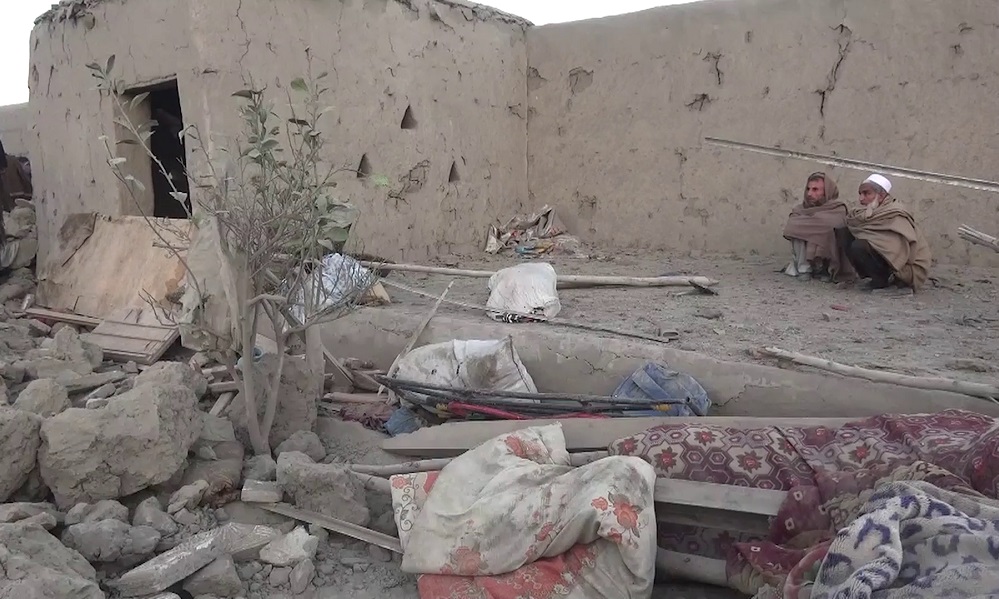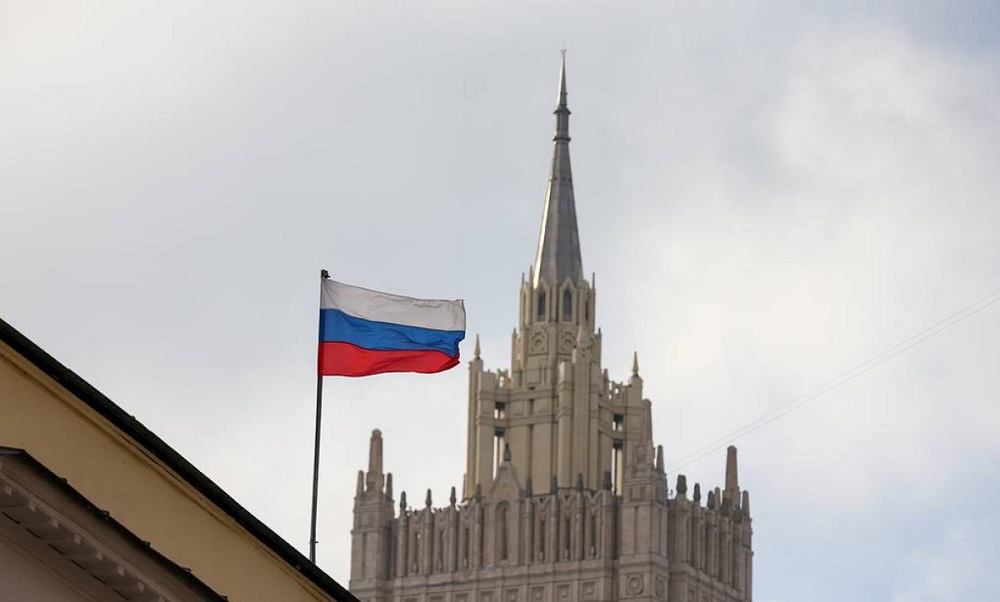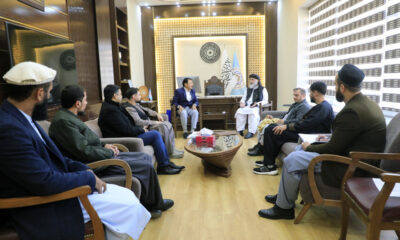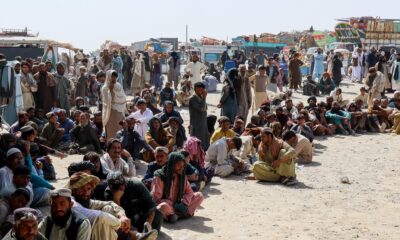Latest News
US likely killed Islamic State second-in-command

 Islamic State’s second in command and other senior leaders were likely killed this week in a major offensive targeting its financial operations, U.S. Defense Secretary Ash Carter said on Friday, the latest setback for the militant group.
Islamic State’s second in command and other senior leaders were likely killed this week in a major offensive targeting its financial operations, U.S. Defense Secretary Ash Carter said on Friday, the latest setback for the militant group.
Carter told a Pentagon press briefing the United States believes it killed Haji Iman, a senior leader in charge of finances for the self-declared caliphate, and Abu Sarah, who Carter said was charged with paying fighters in northern Iraq.
U.S. Marine General Joseph Dunford, chairman of the Joint Chiefs of Staff, told the briefing the deaths reflected “indisputable” new momentum in the fight against Islamic State.
U.S. special forces carried out the strike against Haji Iman, officials told Reuters. The original plan was to capture, not kill, him. But after the commandos’ helicopter was fired on from the ground, the decision was made to fire from the air, said one of the officials.
Coalition soldiers rarely operate in Islamic State-held parts of Iraq, where there are no friendly forces to help if a mission runs into trouble.
Dunford said he expected to increase the level of U.S. forces in Iraq from the current 3,800 and bolster the capabilities of Iraqi forces preparing for a major offensive against Islamic State in Mosul, but that those decisions had not been finalized.
“We are systematically eliminating ISIL’s cabinet,” Carter said, using another acronym for the group.
The strike comes amid growing pressure on Islamic State, which is steadily losing territory in Iraq and Syria to U.S.-backed forces.
While the operational significance of removing Haji Iman from the battlefield is not yet clear, it is the latest in a series of strikes against the group’s top leaders, including Abu Omar al-Shishani, described by the Pentagon as the group’s “minister of war,” and a senior Islamic State chemical weapons operative captured by Iraq-based U.S. commandos and turned over to the Iraqi government.
Carter said the killing of Haji Iman, who also went by Abd ar-Rahman Mustafa al-Qaduli and other aliases and who was imprisoned in the region until 2012, would hamper the group’s ability to operate inside and outside of Iraq and Syria. But he conceded that alone was not sufficient to cripple it.
“These leaders have been around for a long time. They are senior, they’re experienced, and so eliminating them is an important objective and it achieves an important result,” he said. “But they will be replaced and we’ll continue to go after their leadership and other aspects of their capability.”
MOSUL OPERATION
U.S. officials said they were helping Iraqis prepare for a major operation in Mosul to take back territory from Islamic State, which aims to establish a caliphate in Iraq and Syria.
U.S. Marines were providing artillery fire at the request of Iraq to help support Iraqi forces moving into new positions, they said. They said Iraqi forces were carrying out the assault and that the U.S. military was not digging in for a larger ground combat role.
Carter said Haji Iman had been involved in external affairs for Islamic State and played a role in recruiting foreign fighters, but could not confirm he had anything to do with this week’s deadly attacks in Brussels, which killed 31 people.
“It’s a big blow to IS,” said Bruce Riedel, a former CIA analyst and Middle East expert at the Brookings Institution think tank. “He has been an important figure going back to a decade ago during Abu Musaib Zarqawi’s era in creating what became ISIS,” he said, using another acronym for the group.
Carter did not explain how the United States had been able to successfully target Islamic State leaders like Haji Iman and al-Shishani.
But the military’s recent successes suggest that bounties on the group’s leaders are yielding tips from members of Islamic State’s top command, said Hisham al-Hashimi, an adviser to the Iraqi government on Islamic State.
The United States offered a reward of up to $7 million for information about Haji Iman, according to the State Department website.
Dunford said the U.S. military had significantly increased intelligence sharing with European militaries in recent months as authorities sought to stem the tide of foreign fighters streaming into Iraq and Syria.
He said fighters from more than 100 countries were now in Syria and Iraq and there were estimates the total exceeded 30,000. Greater cooperation was needed by all those countries to avert attacks like the ones in Brussels, he said.
Written By: Reuters

Latest News
Eight schoolchildren among those killed in Pakistani airstrikes in Afghanistan

The Ministry of Education reported the tragic losses, highlighting the impact of strikes on civilians and students in the region.
Education Ministry spokesman Mansoor Ahmad Hamza also said that a student at a religious seminary was injured in Barmal district of Paktika province, another area affected by the Pakistani military attacks over the weekend.
Dozens of civilians have reportedly been killed or injured in the airstrikes, which Afghan authorities say targeted residential homes and community areas in both Nangarhar and Paktika provinces.
Local sources describe scenes of devastation, with families searching through rubble and emergency personnel rushing to rescue trapped individuals.
Afghanistan’s Ministry of National Defense condemned the strikes, saying they constitute a violation of Afghan sovereignty and have caused significant civilian harm.
Officials reiterated that Afghan territory must not be used for attacks against other countries and called for restraint and dialogue to prevent further escalation.
The strikes come amid ongoing tensions along the disputed Durand Line between Afghanistan and Pakistan, where security concerns and accusations of militancy have frequently strained relations between Kabul and Islamabad. Analysts note that repeated civilian casualties risk further inflaming regional tensions and complicating diplomatic efforts to reduce violence along the frontier.
Latest News
Russia estimates up to 23,000 terrorists present in Afghanistan

The Russian Foreign Ministry has estimated that around 20,000 to 23,000 fighters from various international terrorist groups are present in Afghanistan, contributing to ongoing security and political challenges in the country.
The ministry noted that over half of these fighters are foreign nationals.
Among the larger groups, Daesh is believed to number around 3,000, the Tehreek‑e-Taliban Pakistan (TTP) 5,000–7,000, and al Qaeda 400–1,500.
Smaller groups reportedly include the East Turkestan Islamic Movement (ETIM), the Islamic Movement of Uzbekistan (IMU/Turkestan Islamic Party), and Jamaat Ansarullah.
According to the ministry, Daesh remains the only group actively hostile toward the Afghan authorities, though it reportedly lacks the capacity to seize territory, focusing instead on undermining public confidence.
Afghan security efforts over the past 18 months are credited with significantly reducing attacks attributed to Daesh.
The Islamic Emirate of Afghanistan has consistently maintained that it will not allow Afghan soil to be used against any other country and continues to deny the presence of armed groups operating freely within the country.
Latest News
Afghanistan lodges complaint with UN over Pakistani airstrikes

Afghanistan’s acting representative to the United Nations has formally raised concerns at the UN Security Council following overnight airstrikes this week it says were carried out by Pakistan inside Afghan territory.
Nasir Ahmad Faiq, acting chargé d’affaires of Afghanistan’s mission to the UN, announced on Monday that a formal complaint had been submitted regarding the strikes, which reportedly resulted in civilian casualties.
In a statement posted on X, Faiq called for “the immediate cessation of such actions, a thorough and impartial review, full respect for Afghanistan’s territorial integrity, and strict adherence to the Charter of the United Nations and international law.”
According to Afghan officials, the strikes took place late Saturday night in eastern Nangarhar and south-eastern Paktika provinces.
Authorities say dozens of civilians, including women and children, were killed or wounded when residential areas were hit.
Islamabad has previously maintained that it reserves the right to act against militant groups it says operate near or along the disputed Durand Line. Afghan officials, however, have consistently rejected allegations that Afghan territory is being used to launch attacks against Pakistan.
The latest incident comes amid heightened tensions between Kabul and Islamabad over security concerns and cross-Durand Line militancy, further complicating already fragile bilateral relations.
-

 Latest News4 days ago
Latest News4 days agoAfghanistan welcomes investment and technology partnerships with India
-

 Sport4 days ago
Sport4 days agoAfghan Peaks founder climbs Aconcagua to promote Afghanistan’s mountain potential
-

 Latest News3 days ago
Latest News3 days agoIndian customs seize Chinese walnuts falsely declared as Afghan
-

 Business4 days ago
Business4 days agoPakistan allows re-export of stranded Afghan transit cargo
-

 Latest News3 days ago
Latest News3 days agoPakistan’s Punjab to send home 20 more Afghans in repatriation drive
-

 Latest News4 days ago
Latest News4 days agoPakistan signals possible air strikes as Kabul releases Pakistani soldiers in goodwill move
-

 Latest News2 days ago
Latest News2 days agoMoldova bans Afghan airlines over safety concerns
-

 Latest News1 day ago
Latest News1 day agoAfghanistan vows retaliation after Pakistan launches air strikes















